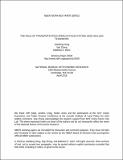The role of transportation speed in facilitating high skilled teamwork across cities
Author(s)
Dong, Xiaofang; Zheng, Siqi; Kahn, Matthew E.
DownloadAccepted version (707.0Kb)
Publisher with Creative Commons License
Publisher with Creative Commons License
Creative Commons Attribution
Terms of use
Metadata
Show full item recordAbstract
© 2019 High skilled workers gain from face to face interactions. If the skilled can move at higher speeds, then knowledge diffusion and idea spillovers are more likely to reach greater distances. This paper measures the knowledge creation consequences associated with the construction of China's high speed rail (HSR) network that connects mega cities, that feature the nation's best universities, to secondary cities. Since bullet trains reduce cross-city commute times, they reduce the cost of face-to-face interactions between skilled workers who work in different cities. Using a database listing research paper publication and citations, we document a complementarity effect between knowledge production and the transportation network. When connected by the HSR, co-author productivity rises, new co-author pairs emerge and more highly productive scientists migrate to the HSR cities.
Date issued
2018Department
Massachusetts Institute of Technology. Center for Real EstateJournal
Journal of Urban Economics
Publisher
Elsevier BV